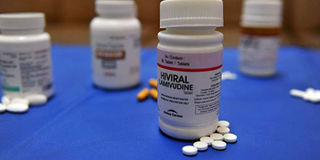Compliance with HIV regimen reduces transmission

Antiretroviral drugs displayed at a public hospital. Everyone is recommended to start treatment straight away after being diagnosed with the virus. PHOTO | ADEK BERRY | AFP
What you need to know:
- In the study, the men with HIV had been taking antiretroviral therapy for an average of four years before it began, making the virus undetectable.
- National AIDS Trust chief executive officer Deborah Gold said more should be done to get the message out to healthcare workers and the public.
There is hope for 1.5 million Kenyans living with HIV, as a study done for eight years revealed that taking antiretroviral drugs consistently reduces the chances of transmission.
The study suggests that the risk of HIV transmission in gay couples through unprotected sex when the HIV viral load is suppressed is effectively zero, and this can as well apply to heterosexual couples.
This is a promising message to researchers, 1.5 million HIV-positive Kenyans and 37 million people living with HIV globally.
The study done between September 15, 2010 and July 31, 2017 enrolled 972 gay couples and the median age for HIV-positive partners was 40 years. The couples reported unprotected sex for a median of one year.
Although 15 men did become infected with HIV during the study, genetic testing showed that none of the viruses came from their main partner.
VIRAL LOAD
The study found no cases of HIV transmission over eight years; this was due to adherence to treatment, hence reducing the virus to no transmission levels in the body.
The European study targeted situations where one was living with HIV and on antiretroviral therapy (ART) and the other was HIV-negative over eight years, from 2010 to 2017.
According to findings from the study, there were no cases of HIV being passed within the couples over that time.
And the researchers say that around 472 cases of HIV are likely to have been prevented.
Dr Nelly Mugo, a researcher at Kenya Medical Research Institute, said there was a possibility of getting the virus.
With adherence, it becomes very difficult to transmit when your viral load is low.
“We are heading somewhere, and I am happy that adherence is now making some sense. It is my hope that with the message people are going to be friendly to their drugs and adhere to them. It will make a great difference when you can’t transmit the virus to your partner,” Dr Mugo said.
CURE
This is the third time researchers are making a breakthrough on HIV cure. Earlier this year, a London-based patient was cleared of the Aids virus.
In 2007, another patient, identified as “the Berlin patient”, received a bone-marrow transplant from a donor with natural immunity to the virus.
American Timothy Brown, said to be the first person to “beat” HIV/Aids, was given a much more aggressive treatment, which included two transplants and total body irradiation (radiotherapy) for leukaemia.
Since then, scientists have been trying to duplicate the research with little success. However, doctors believe the gays' study is a breakthrough and can be applied to the general public.
"Our findings provide conclusive evidence that the risk of HIV transmission through anal sex when the HIV viral load is suppressed is effectively zero," the study revealed.
The study was published in the Lancet medical journal on Thursday. Its findings add to an earlier phase of the study that looked at HIV transmission risk for serodifferent heterosexual couples who also did not use condoms. It also found zero risks.
TREATMENT
In the study, the men with HIV had been taking antiretroviral therapy for an average of four years before it began, making the virus undetectable, defined as fewer than 200 copies per ml of blood.
Most people reach this level after taking daily HIV treatment for six months. Most people with HIV take a combination pill once a day but others can take up to four pills a day depending on their specific health needs.
Everyone is recommended to start treatment straight away after being diagnosed.
Prof Alison Rodger, study author and professor of infectious diseases at University College London, said anal sex was known to have the highest risk of transmission, but gay men should be reassured.
“This powerful message that "undetectable equals untransmittable" should be basic HIV knowledge for everyone, and it can help end the HIV pandemic by preventing HIV transmission and tackling the stigma and discrimination that many people with HIV face," Prof Rodger said
She called for all people living with HIV to have access to testing and effective treatment.
AWARENESS
Deborah Gold, chief executive of National AIDS Trust said more should be done to get the message out to healthcare workers and the public.
“There needs to be a much better understanding of how HIV is and isn't transmitted, and the fact that treatment stops transmission, in the NHS and beyond. We think this is vital to addressing stigma."
Previous research has shown zero risks for heterosexual couples passing on the virus when one person is taking HIV treatment, prompting UNAIDS to launch its undetectable untransmittable campaign.
Dr Ford Hickson, from the London School of Hygiene and Tropical Medicine, said the study confirmed that if people suppress their HIV with antiretroviral therapy, they "cannot pass their virus to other people during sex, whatever kind of sex they have".




